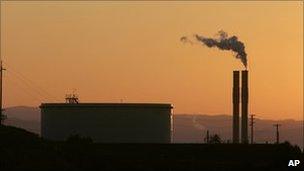California approves extensive carbon-trading scheme
- Published

California has long championed efforts to curb greenhouse gases
California has approved an extensive carbon-trading plan aimed at cutting greenhouse emissions.
State regulators passed a "cap-and-trade" framework to let companies buy and sell permits, giving them an incentive to emit fewer gases.
The aim is to create the second-largest market in the field, after Europe's.
State officials hope the scheme will be copied across the US, but opponents warn it may harm California's growth and lead to higher electricity prices.
California's Air Resources Board approved the new rules late on Thursday. They are part of a landmark state climate bill passed by the legislature in 2006, which set 1 January 2011 as the deadline for enacting a cap-and-trade system.
The scheme means that from 2012 California will allocate licences to pollute and create a market where they can be traded.
A company that emits fewer greenhouse gases than its permits allow, could sell the extra capacity to a dirtier firm.
By making over-polluting more expensive, the scheme aims to provide incentives to develop greener technology.
Over time the total amount of greenhouse gas emissions - the cap - is to be reduced. California wants to cut emissions to 1990 levels by 2020.
Costs
Although all firms will eventually need to buy greenhouse gas allowances, most of the permits will be given away in the first three-year period.
But many businesses fear they will suffer in an economy that is struggling to emerge from recession, the BBC's Rajesh Mirchandani in Los Angeles says.
Dorothy Rothrock of the California Manufacturers and Technology Association told Reuters news agency: "There are definitely going to be some costs incurred right up front for these companies."
Outgoing Governor Arnold Schwarzenegger - who supports environmental causes - argues that growth in emerging green technologies will offset the costs of cap-and-trade.
"Since 2006 or so green jobs have been created 10 times faster than in any other sector," he said.
California - the world's eighth largest economy - already has strict climate-related regulations, including renewable energy mandates for utilities, and tough fuel-efficiency standards for cars.